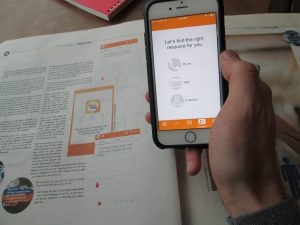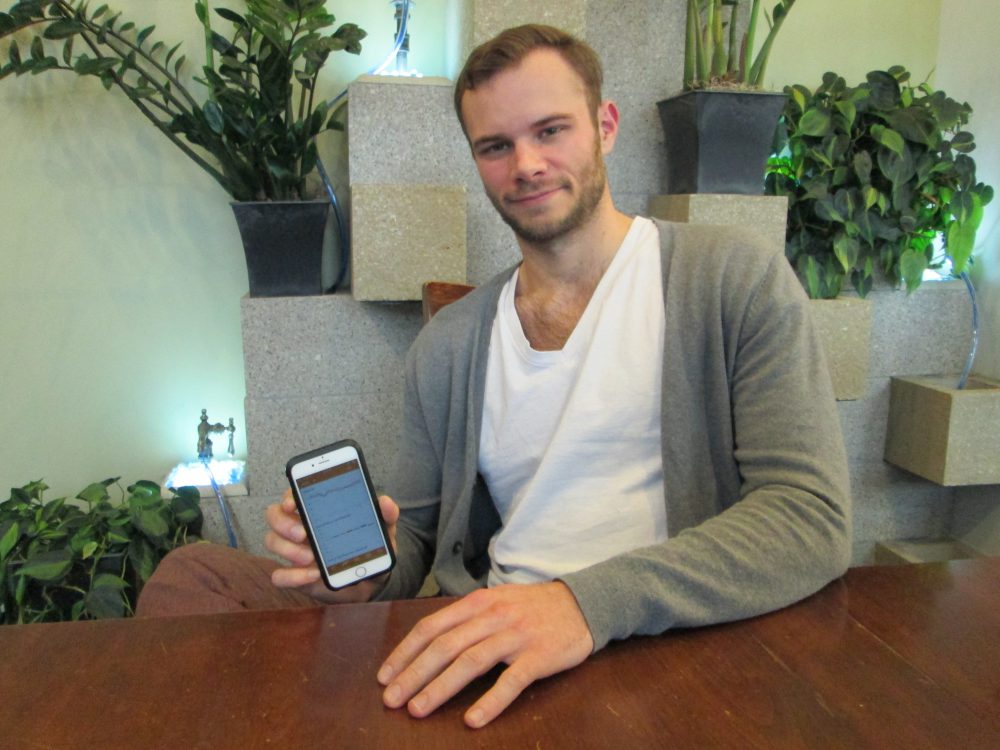Adam Moen stood with his hands gripping the railing of the Washington Avenue Bridge. It was the end of the spring semester in 2011, and the University of Minnesota student was disillusioned with the life he was building for himself.
But Moen pulled himself away from the railing on that day and on several other days before the semester’s end.
Today Moen has stepped away from that edge entirely and now works to help others—particularly young people—who find themselves lost as he was.
Moen’s day job is to manage a group of mobile nurse practitioners for Livio Health Group, a clinic that brings services to patients’ homes. Moen also acts as a consultant to companies when they have ideas for healthcare innovation that they want to bring to market.

But his side project is his passion: an innovative mobile phone app he created called Marblesapp, or Marbles, something he says takes “philosophical precedence.” The app offers support to those who have “acute, episodic mental health needs,” Moen said, especially during the sometimes-lengthy gaps between visits with mental health professionals.
The app was developed, as Moen said, “in what little spare time I have.” However, the app is still very sophisticated, and it has multiple core functions. In addition to giving users a way to check in on how they are feeling using short surveys, the app also tracks their responses over time and offers an online, anonymous support forum between users.
Paradoxically, Moen is using the internet to tackle a problem he thinks often stems from people overusing social media sites, such as Facebook and Instagram, where people “share only what they want others to see,” as they construct polished profiles that hide imperfections, he said. “Vulnerability has been taken out of the equation, out of the human experience,” he said.
But the internet also offers advantages such as a low-risk environment, accessibility, convenience, round-the-clock support that can have a positive impact, he said.
More broadly, the app is a testament to Moen’s persistence through pain and his unyielding belief, demonstrated through his life, that people can rewire their outlooks and even their thoughts. Then, they can become leaders who create mental environments, both internally and externally, that support mental health.
Hiding from Imperfection
Moen knows first-hand how unhealthy it is to hide from life’s imperfections.
That’s a message he didn’t always get as a child growing up in Mahtomedi, Minnesota, a higher-end suburb of St. Paul with exceptional schools, athletics and extracurricular activities.
“Excellence wasn’t just expected,” he said, “It was demanded.”
Although his parents had an “appetite for excellence,” Moen said his family was always supportive once they realized he was having serious struggles.
His father, David Moen, a physician leader and healthcare consultant, saw his son’s capacity to think strategically about a project from a young age. His younger brother, Luke, a financial consultant in the healthcare industry, recalls Moen using sensitivity and empathy to bring kids in different age groups together.
Moen, meanwhile, drove himself hard in college. Moen would work intensely five days a week only to find relief from two days devoted to partying, he said. The result was a serious problem with substance abuse that only worsened his ability to cope.
From the outside, he looked like a model student. As a fraternity member and straight-A undergraduate in his third year of studying finance at the Carlson School of Management, he said he “pushed on all fronts” by having fun, finding internships and involving himself with activities and clubs.
Yet inside, Moen said, he felt worthless and inadequate. “Everything I did was never worthy of love or appreciation,” he said. “Nothing felt good, or worthy of love—I was just bad at life. Even if I won a gold medal, I still felt terrible,” he said.
A New Mindset and a Supportive Community
Moen’s family realized he was struggling. Eventually, they set him up with a therapist who helped Moen reevaluate his self-hatred and build skills to author his own life instead of watching it pass him by.
On the road to mental health recovery, Moen even took leadership by volunteering to lead a weekly mental health support group affiliated with the National Alliance on Mental Illness, which he still leads. The group therapy dynamics helped inspire Marbles’ commitment to building community, he said.
During his senior year, Moen also took a leadership position at the University’s chapter of Active Minds, a nonprofit that raises awareness about mental health issues. Moen’s inventiveness surfaced when he helped organize a mental health awareness event. The University agreed to set up 1,100 chairs on the front lawn of Coffman Memorial Union to represent the thousands of college student suicides nationwide every year.
But the weather turned bad. So Moen adapted—without the University’s permission—by lining up the chairs across the Washington Avenue Bridge.
Moen’s father recalls the power of that display as passersby could see the number as they walked down the lines of chairs. People then wrote paper notes on the chairs memories of people lost to suicide. “Adam made an adaption and made it a more powerful statement,” David Moen said.
News outlets came out to cover the event, but Moen also “drew some flak,” his father said, when University officials raised concerns about the weight of so many chairs on the bridge.
A Life of Authorship
Moen has continued undaunted to advocate strongly for mental health, driven by a desire to give back to the mental health community by “sharing” instead of “hoarding” what he has learned, he said.
Matthew Hanson, Boynton Health’s mental health services assistant director and former adviser to Active Minds, said Moen was “impressive” when he served as student representative on The Provost’s Committee on Student Mental Health. Even in a room of experienced University directions, Moen wasn’t shy about sharing his ideas about how to help the student body.
With Marbles as his current passion, Moen wants a place for people to bring in-person spontaneity to the internet as they interact about mental health problems, particularly in the app’s forum section.
Eventually Moen wants to crowdsource Marbles’ response data and, with the help of algorithms and artificial intelligence, have the app autonomously identify mental health problems and suggest solutions.
Just as he has benefited from resources, community and self-support, Moen hopes the app can provide similar help for people online, playing a role in keeping young adults off the edge of the bridge—carrying them instead into a life of authorship and helping others.
Moen knows how tumultuous life can be, but he believes no matter what, you should not let regrets haunt you. There is always a path forward and, as Moen said, “You need every experience to get you where you’re at now in your life.”

